НАУЧНО-ОБРАЗОВАТЕЛЬНОЕ КУЛЬТУРОЛОГИЧЕСКОЕ ОБЩЕСТВО
НАУЧНАЯ АССОЦИАЦИЯ ИССЛЕДОВАТЕЛЕЙ КУЛЬТУРЫ
Научное рецензируемое периодическое электронное издание
Выходит с 2014 г.

Гипотезы:
ТЕОРИЯ КУЛЬТУРЫ
Э.А. Орлова. Антропологические основания научного познания
Дискуссии:
В ПОИСКЕ СМЫСЛА ИСТОРИИ И КУЛЬТУРЫ (рубрика А.Я. Флиера)
А.В. Костина, А.Я. Флиер. Тернарная функциональная модель культуры (продолжение)
Н.А. Хренов. Русская культура рубежа XIX–XX вв.: гностический «ренессанс» в контексте символизма (продолжение)
В.М. Розин. Некоторые особенности современного искусства
В.И. Ионесов. Память вещи в образах и сюжетах культурной интроспекции
Аналитика:
КУЛЬТУРОЛОГИЧЕСКИЕ РАЗМЫШЛЕНИЯ
А.Я. Флиер. Социально-организационные функции культуры
М.И. Козьякова. Античный космос и его эволюция: ритуал, зрелище, развлечение
Н.А. Хренов. Спустя столетие: трагический опыт советской культуры (продолжение)

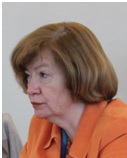
Утилитарные интенции искусства и архетип Европы:
«эпоха становления»
Аннотация: Искусство, обращаясь к чувственному миру человека, владея особым языком интенциональности, как никакая другая деятельность способно помочь в выявлении культурного кода эпохи, в раскрытии его глубинных архетипических структур. Автор рассматривает историю европейского искусства сквозь призму его «утилитарности», доказывая, что выбор эстетических практик определялся преимущественно социентарным статусом отдельных групп, их коллективными потребностями и предпочтениями.
Ключевые слова: искусство, культурный код, интенции, архетип, утилитарность, Античность, Греция, Рим, Средневековье, Возрождение, Новое время, музыка, архитектура, скульптура, живопись, церковь, дворянство, аристократия, бюргеры, барокко, рококо, классицизм, реализм.
Как загадочный сфинкс, древний и в то же время вечно обновляющийся феномен, искусство неизменно притягивало внимание исследователей. В XX веке оно демонстрирует чрезвычайное многообразие форм, эклектику, контрасты. Теряется стилистическое единство, генерализованный ранее вектор распадается на множество отдельных, не зависимых друг от друга течений, имеющих зачастую весьма причудливую траекторию движения. Противоречивость художественной практики проявляется в непредсказуемости творческих метаморфоз: радикальный отказ от прошлого соседствует с восприятием художественного наследия давно ушедших эпох – античности, средневековья, традиционных и первобытных культур. Искусство одновременно и сверхсовременно, и архаично: нарушая логику преемственности, последовательность поступательного движения, оно обращается вспять, реанимируя эстетику, чуждую духу Нового времени.
Что может дать исследователю культуры весь этот пестрый мир, хаос звуков, красок, форм, обращенный к чувствам, а не к логике, и не преследующий, казалось бы, никаких утилитарных целей? Видимость обманчива: лучше и тоньше чувствуя дух своего времени, художники воплощают в своих произведениях ту эволюцию культурных форм, которая и является «предметом истории в самом широком смысле» [1]. Обращенное не к логике, а к чувству, художественное творчество соприкасается с «тонким миром», недоступным формально-логическим процедурам. Коллективное бессознательное охватывает сферу иррационального, которую не удается постичь разумом, но которая чрезвычайно важна для общества.
Искусство «утилитарно»: социентарный статус, потребности, специфика жизнедеятельности формируют коллективные предпочтения в выборе эстетических практик. Подобно зеркалу параболической антенны телескопа, способному улавливать свет, идущий из глубины вселенной, искусство фокусирует, делает видимыми процессы, скрытые в глубинах коллективного бессознательного, – в конечном счете оно репрезентирует культурный архетип. «Великое искусство всегда оплодотворялось мифами» [2]: впитывая бессознательные установки психики, «подлинные, но невидимые корни сознания, оно прокладывает дорогу к архетипам. Архетипическая модальность сублимируются и визуализируются искусством [3]: тем выражением универсально человеческого, что передается от поколения к поколению, поскольку «мифология есть коллективная, а не индивидуальная психика» [4], как утверждает аналитическая психология в лице К.Г. Юнга. Определяя жизнь человека, эта система установок, способов понимания действует незаметно и потому максимально эффективно.
Искусство идет за временем, отражая глубинные трансформации архетипических структур, опосредуя повседневный нарратив в качестве семантических доминант. «Сегодня первостепенное значение исследователь должен придавать историчности художественного процесса, связывая эту историчность с консервативными слоями истории событий» [5], – так может быть сформулирован актуальный вектор исследовательской активности. Динамика творческого процесса, его историчность наиболее ярко проявлена в истории Европы. Античность – Средневековье – Возрождение – Новое время – эти периоды академически традиционно классифицируют художественную эволюцию Старого Света, накопившего за свою длительную историю богатые «музейные фонды». Разнообразный материал дает возможность выделить специфику отдельных этапов «эпохи становления», завершающейся вместе с победой Великой французской революции. Начало же можно традиционно отнести к юности европейской культуры – к Античности.
В Греции искусство растворялось в повседневной жизни античного универсума, соединяясь с ремеслом и с производством, обретая тем самым утилитарный, функциональный характер. Оно не репрезентировалось как отдельный, самостоятельно существующий феномен: не рефлектировалась его онтологическая специфика как семантически выделенной сферы, не оформлялись дефиниции данного референтного поля. А. Лосев говорит в этой связи об обычной для греков трактовке эстетической области, «которая сразу и одновременно характеризуется и как жизненно-заинтересованная и как предмет чистого и незаинтересованного созерцания, как предмет самодовлеющего удовольствия» [6].
В греческом мире, тем не менее, выделенным оказывается ряд искусств, находившихся под покровительством Аполлона Мусагета, водителя муз — так называемые мусические искусства: музыка и пение, танец. Музыка, являясь сложным понятием, включала в себя также другие виды художественного и интеллектуального творчества: поэзию, эпос, трагедию, историю. Они обладали более высоким статусом, чем пластические и механические искусства, непосредственно идентифицировавшиеся с ремеслом, что отражало особенности греческого культурного кода.
Искусство, его различные виды связаны с агональностью, выражающей полисный архетип. В мусических искусствах состязание становится обыденным явлением – в пении, танце, игре на музыкальных инструментах, чтении поэм Гомера, в театральном искусстве, где агональность проявляется при конкурсном отборе пьес, оценке постановки, игры актеров. Как мусические, так и пластические, механические искусства оформляют отдельные аспекты, разновидности жизненных практик. Все они в той или иной степени несут в себе «гены» архетипических свойств греческой культуры: созерцательности и гармонии, агональности и антропоморфизма, рождающихся в симбиозе природных и полисных начал.
С триединой хореей — пением, музыкой (игрой на музыкальных инструментах), танцем связаны все греческие праздники, посвященные богам. Их сакральность требовала торжественного оформления, и потому традиционным становится мусический репертуар Дионисий и Панафиней, Элевсинских мистерий и Гимнопедий, Дельфинарий и Кроний, Пифийских или Истмийских игр. Это дифирамбы, прославляющие Диониса, пеаны и гипорхемы, посвященные Аполлону, эпиникии, славящие победителей игр, симпосионные сколии, звучащие на пирах, гименеи и эпиталамы, приуроченные к свадьбам, иалены, сопровождающие окончание жизненного пути.
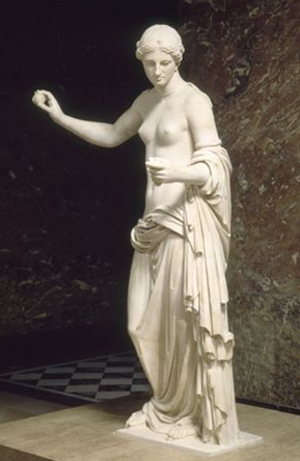
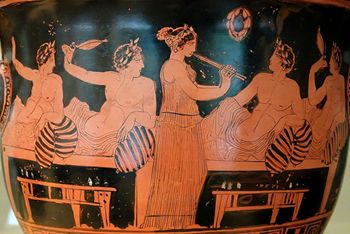
Пластические и механические искусства котировались гораздо ниже. Художники, архитекторы, скульпторы не только не имели приоритета как носители творческого начала, сублимирующие свой эмоциональный, духовный, творческий потенциал в художественные творения, но и занимали низшие ступени социальной таксономии. По мнению Платона, искусство аналогично techne, оно «пришло в мир как мастерство», как средство удовлетворить насущные потребности, подразумевая в этой связи образ Пифагора, «своего рода Прометея». Именно в этом контексте — искусство как человеческая деятельность, как ремесло, данный концепт был впервые актуализирован софистами в отношении риторики: они моделируют структуру, композицию, лексику вербального контента.
По иронии истории, именно высокохудожественное «ремесло» дало классические образцы греческой простоты и ясности форм, искусства в его высоком смысле. В шедеврах греческой пластики материализуются идеи гимнофилии, восхищение прекрасным человеческим телом, идеал калокагатии. Высокой эстетической ценностью отличалась также продукция многих отраслей ремесла – оружия, ювелирных украшений, мебели, одежды; по сути, они являлись предметами декоративно-прикладного искусства. Так, наглядный образец дает керамика – статуэтки (статуи), разнообразная бытовая посуда, посвятительные и погребальные сосуды: вазопись (чернофигурная, краснофигурная) наделяла их художественной ценностью.
Важнейший вектор интенциональности искусства связан с религиозным дискурсом. Античные религиозные системы Греции и Рима, при всех их отличиях, типологически близки. Боги, воплощая природный универсум, обладали антропоморфными характеристиками, заимствуя у смертных как внешний облик, так и поведенческую специфику. Мир богов соседствует с миром людей — именно эти представления нашли отражение в греческой мифологии, в пластике, в архитектуре. Боги присутствовали в мире людей как интеллигибельно, в эмоционально-мистическом опыте, так и в объективированной художественной интерпретации. Мраморные статуи поражали своим жизнеподобием — выглядели «как живые», отмечали современники: тончайшая моделировка позволяла передавать чувства и состояния, делала образы одухотворенными и глубоко индивидуальными. Вызывало удивление также их количество — в Афинах, например, казалось, что статуй больше, чем людей (Платон). Богам приносились дары, строились прекрасные храмы – земные жилища небожителей, достойные своих хозяев. Архитектоника храмов также подчинялась потребностям культовой практики: темное и тесное внутреннее пространство не было рассчитано на пребывание в нем большой массы людей, поскольку отправление ритуала, как правило, происходило снаружи.
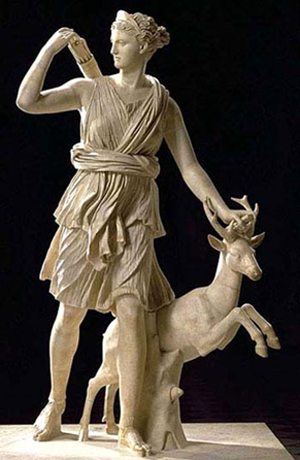
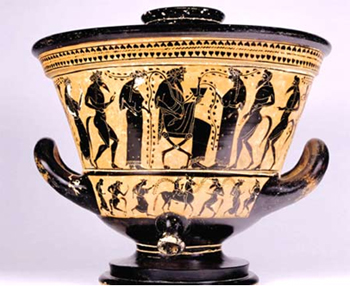
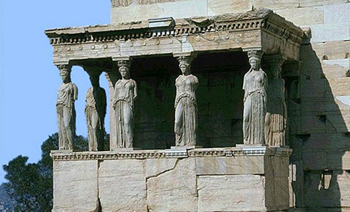
В отличие от Греции, где праздники, посвященные богам, требовали музыкального сопровождения, в Риме они утрачивают свое сакральное содержание и превращаются, в значительной степени, в развлекательные мероприятия. Это же характеризует и феномен театра: по мнению римских обывателей, трагедия была «слишком идеальна» и потому не пользовалась успехом. Снисходительнее относились к комедии, но главное место среди сценических представлений занимал мим со своим бытовым сюжетом, танцем и жестом, свободной импровизацией актеров. Отдельной частью зрелищной индустрии, любимым развлечением являлось отнюдь не художественное действо – бои гладиаторов, звериные травли, морские сражения – навмахии. Для них специально разрабатывались сценарии, работала «режиссура», готовилась сценография, позволявшие превращать массовые убийства в особый род массовых зрелищ.
Для римской античности характерен высокий уровень развития архитектуры и строительства, позволявший «материализовывать» претензии официальной идеологии, увековечивая их в монументальной художественной форме. В идее Вечного города Риму была уготована роль властелина и вечное величие: такова основная идея грандиозных сооружений, отразившая культурный код «мировой» гегемонии. Завоевывая новые государства, Рим воспринимает их культурные формы, адаптирует и перерабатывает технические приемы и эстетические взгляды. Принцип заимствования – одна из главных архетипических установок, нашедшая себе применение в различных сферах. В строительстве соединяются воедино традиции греческой, малоазийской архитектуры, вырабатывается собственная система. Римские зодчие конструктивно обогатили архитектуру, широко используя в своих объемных сооружениях арку, формы крестовых и купольных сводов, создали особую схему внешнего оформления – ордерную аркаду.
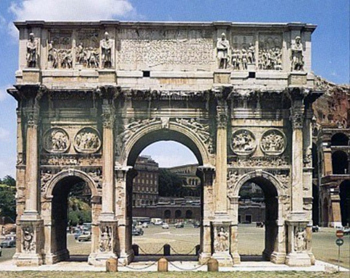
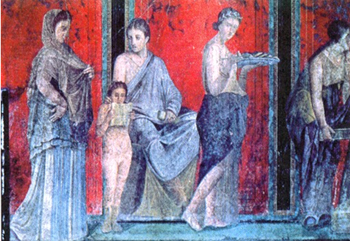
Римское искусство связано также с водой — важным компонентом культуры, определившим многие традиции, стереотипы поведения, тенденции творческого процесса. Культ воды [9], сакральное отношение к ней выражалось в художественном оформлении фонтанов, уличных колодцев, природных источников, в строительстве роскошных терм, поскольку изобилие воды создавало определенные привычки и купание становилось ритуалом, любимым времяпрепровождением. Внутреннее оформление бань представляло большую художественную ценность: мозаичные полы, стенные росписи, скульптура. Статуя Аполлона Бельведерского украшала некогда термы Каракаллы, а скульптурная группа Лаокоона — термы Траяна. Термы — пример не только римского искусства, но и наличия огромных богатств, которые стекались в Рим в результате победоносных войн, эксплуатации провинций, порождая безвкусную роскошь и расточительство. Именно об этом писал Сенека: «Мы до того дошли в расточительстве, что не желаем ступать иначе как по самоцветам» [10]. Вычурность и помпезность становятся нормой римской архитектуры.
Репрезентативной иллюстрацией к динамике развертывания художественной морфологии может служить античная пластика, а именно скульптурный портрет. Идеал греческой калокагатии не предполагал портретной достоверности, скульптурные образы носили обобщенный, идеальный характер. Естественно, детерминируемый иными условиями, иными ментальными установками, он не реализуется на римской почве. Рационализм, консерватизм, коллективизм, организованность закрепляются в социокультурном комплексе римской цивитас. Ее архетипические характеристики, связанные с патриархальностью, почитанием рода, культивированием межгенерационных связей, находят свое выражение в искусстве скульптурного портрета, запечатлевавшего членов семьи. Здесь Рим достигает художественных высот, имеющих непреходящее культурно-историческое значение.
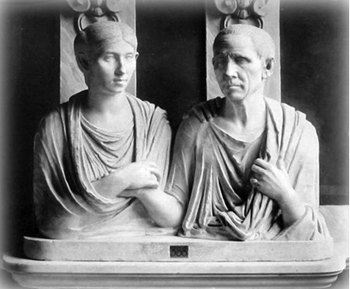
В первые, «темные» века, наступившие после падения империи, хаос и анархия воцарились на ее бывших территориях. Обломки глобальной и мощной цивилизации накрываются волнами варварских нашествий и Запад тотально варваризируется, схоронив под развалинами городов великое наследие античности. Варваризируется и искусство, имея в своем арсенале лишь малую толику того мастерства, которым некогда славились народы, обитавшие на этих пространствах. Орнаментально-декоративные формы бытовых предметов, атрибуты церковного культа – звериный стиль, плетение, незамысловатый узор – вот и весь набор художественных практик, с которого начиналась новое, средневековое искусство.
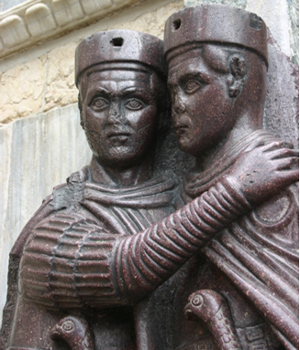
Теологическая доктрина христианства признает прекрасным только атрибуты божественного творения, при этом телесная красота, как известно, почиталась греховной. Отождествление прекрасного с полезным, функциональная целесообразность деятельности, в том числе художественного творчества, является одной из важнейших доминант теолого-эстетической рефлексии. Именно в данном контексте следует оценивать развитие искусства, его эволюцию, интерпретируемую в романском и в готическом стилях: «Стиль есть судьба …проявление бессознательного душевного начала…» [11].
Первый общеевропейский художественный стиль – романика, символизирует начальные, пока еще робкие шаги по направлению к выработке единой европейской архитектоники. Он реализуется в основном в архитектуре. Романская архитектура производит впечатление мощи и неприступности: толщина стен, строгость и суровость как атрибут военного времени отвечает самой главной ценности – надежной защите, обороноспособности, обеспечению безопасности. Мозаика (Византия, Венеция), стенная роспись обеспечивают декоративную организацию внутреннего пространства.
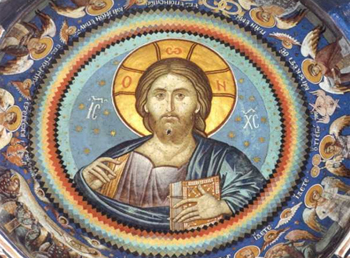
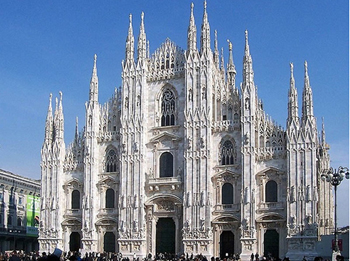
Приоритет интересов церкви отчетливо проявился в искусстве Византии, в искусстве средневековой Руси: в данном ключе развивались архитектура, скульптура, живопись, многие декоративно-прикладные виды искусства. С христианским дискурсом связаны литература и театральные действа – церковные мистерии и миракли, культовое песнопение, становление одноголосия и полифонии. Господствующий класс следовал за церковью, практикуя меркантилизм в подходе к художественному творчеству, используя его для репрезентации собственного статуса, оформления окружающей среды, создания предметов роскоши. И снова звучит лейтмотив утилитарности – прекрасное отождествляется с полезным, имеет функциональное предназначение, привносится во всякую деятельность. Это качество средневекового искусства, а также средневековой эстетики специально акцентирует У. Эко, называя его фундаментальным [14].
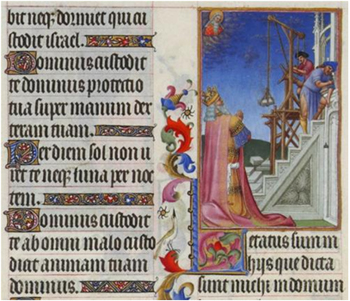
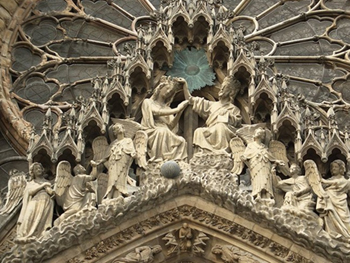
Антропоцентризм отражает архетипические интенции переходной эпохи, штурмующей, пока еще в идейно-художественной форме, бастионы средневековой сословно-теоцентристской цитадели. «О, дивное и возвышенное назначение человека, которому дано достигнуть того, к чему он стремится, и быть тем, чем он хочет!» — провозглашает в конце XV века Пико делла Мирандола один из первых манифестов нового мира. В контексте новых взглядов приобретают высокую оценку экзистенциальные ценности: античный эпикуреизм, этика наслаждения, восхищение красотой человеческого тела. Светский жизнеутверждающий характер искусства, оптимизм составляют важнейшую черту Возрождения, открывая одновременно новую страницу в его утилитарных трендах.
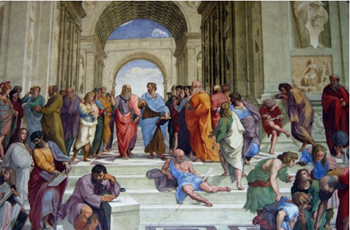
Таковы же папские или кардинальские дворы, где оказывали покровительство наукам, собирали предметы искусства, книги и рукописи, как делали это знаменитые папа Николай V (Томазо Парентучелли) или Пий II (Эна Сильвио Пикколомини). В XV веке была основана Платоновская академия, которая возглавлялась видным представителем гуманизма Марсилио Фичино. Постепенно создавалась среда, определявшая художественные вкусы своего времени, формировавшая социальный заказ: именно в данном контексте появлялись произведения искусства, предназначенные для узкого круга знатоков, способных оценить рафинированную утонченность творений.
В эпоху Ренессанса появляется пышное, торжественное и величественное декорирование. Роскошь используется теперь в политике как средство управления. В отличие от Средних веков утверждается новый взгляд: великолепные вещи и их коллекции должны выполнять презентационную функцию, демонстрировать вкус и могущество знати. Собрания скульптур, картин, керамики представляют собой неотъемлемую часть нового образа жизни. Многие из итальянских князей известны не только как покровители искусств, но и как коллекционеры: Лоренцо Медичи, например, обладал знаменитой коллекцией монет, камей и медалей, а также великолепной библиотекой.
В эпоху Возрождения были заложены принципы, определившие все последующее развитие европейского зодчества. В обиход вошел экипаж, а позднее — кареты: «вселенная обрела колеса». Это породило сложные проблемы по расширению пропускной способности узких средневековых улиц, ликвидации хаотичной застройки. Возрождается античная практика рационального, сознательного планирования: создавая идеальный мир, итальянские гуманисты конструировали «идеальный город». Градостроительство развивалось прежде всего в направлении гармоничной организации пространственных форм, в выборе определенных эстетических предпочтений, в осознании визуальной целостности городской среды. Геометрический принцип, положенный в его основу, приведет позднее к подлинному расцвету прямоугольной (шахматной) планировки.
Архитектура Ренессанса разработала новую конструктивную систему и основные архитектурные формы: типы новых городских многоэтажных зданий, светских и церковных сооружений, системы фасадного убранства. Ренессансные разработки предвосхитили зодчество Нового времени, заложив основы будущих урбанизационных проектов. Архитекторы, скульпторы, художники получают от властей заказы на строительство и украшение крупнейших городских комплексов.
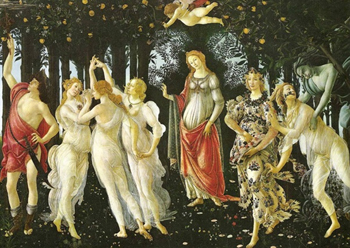
Сложные комплексы архитектурных работ ведутся и в других регионах, где также на первый план выдвигаются столицы. Далее они будут неизменно находиться в привилегированном положении, соперничая друг с другом не только в экономическом и политическом могуществе, но и в великолепии архитектуры, ее достижениях в отдельных областях. Большое развитие в некоторых регионах, в том числе в Нидерландах, во Фландрии получила гражданская архитектура – ратуши и склады, дома патрициев, а также цеховых, гильдейских организаций. Во Франции возникает совершенно новый тип загородного дворца, предназначенного для временного пребывания знати во время охоты и увеселений – дворец Шамбор, Шенонсо и др.
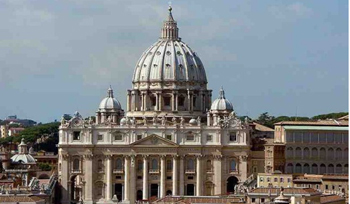
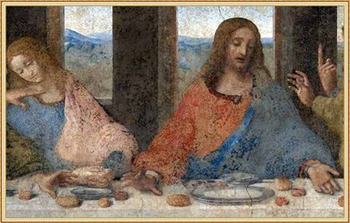
Вкусы заказчиков, конкретные потребности и запросы во многом определяли тенденции развития отдельных школ, региональную иди локальную специфику. Так, в северных странах не находилось необходимых предпосылок для развития монументальной живописи, более укоренена была там книжная миниатюра. Книги с иллюстрациями предназначены были для самых знатных персон: примерами роскошных образцов искусства миниатюры являлись «Большой часослов герцога Беррийского», «Псалтырь королевы Мэри» и др.
С деятельностью братьев ван Эйков, патриархов и основателей нидерландской школы живописи, связывают коренной переворот в традициях западноевропейской живописи — появление станковой картины, письмо маслом. Расширяется тематика произведений, выделяются в качестве отдельных жанров бытовая живопись, пейзаж, портрет, натюрморт. Относительно дешевым и демократичным видом изобразительного искусства, пользовавшегося большой популярностью, становится гравюра. Открытие книгопечатания, прогресс в производстве бумаги создают предпосылки для ее широкого распространения.
Дальнейшие пути в развитии европейского искусства пролагаются социентарными аспектами цивилизационных трансформаций, модификацией средневековых архетипических структур. Новое время знаменует собой процесс формирования крупных европейских наций, проявления ярких особенностей их художественной культуры. В отдельных странах появляются большие национальные художественные школы. Это период расцвета искусства Италии, Фландрии, Испании, Франции, Голландии и, вместе с тем, время крупнейших завоеваний реалистического искусства этих стран.
Нововременные тренды не только диверсифицируют европейский универсум, но и сохраняют некие общие архетипические черты, объединяющие и сплачивающие цивилизационный вектор. К ним относятся «проект модерна», технический прогресс, формационная парадигма. XVII век лишь намечает архитектонику будущего европейского дома. К консолидирующим факторам принадлежит и общая для национальных культур стилевая эволюция. Опосредуя утилитарные интенции, она позволяет обнаружить динамику европейского архетипа, проследить его трансформацию — именно она в полной мере отражает и визуализирует те или иные аспекты формационных процессов, моделируя их художественное претворение.
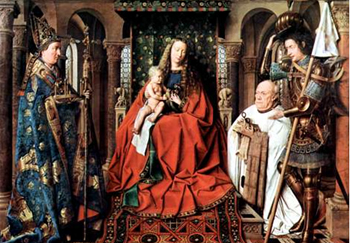
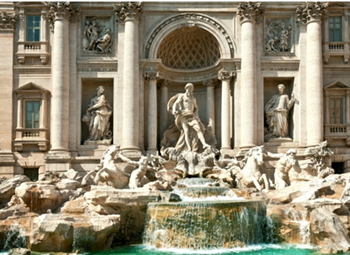
Стиль характеризует эпоху, порождающую небывалый динамизм, пафос и масштаб культурных преобразований. Задачи, стоявшие перед художником, носили как идейный, так и утилитарный характер, в них совмещались потребности конфессиональной апологии и чисто декоративной функциональности. Искусство адекватно отвечало на вызовы времени, что хорошо прослеживается в живописи того времени. Господство церкви определяло здесь преобладающую тематику: торжественные образы Христа и Мадонны, деяния святых, библейские эпизоды. Особенно востребованными были сцены казней и мучений святых, состояние экстаза, оказывавшие наиболее сильное эмоциональное воздействие на зрителя.
Запросы дворянско-придворных слоев, кругов крупной буржуазии открывали иные жанровые спектры. Для украшения жилищ были уместны мифологические, аллегорические сюжеты, другие темы светского характера, служащие прославлению тех или иных представителей владетельных семей. Особой популярностью пользовались изображения охоты, пейзажи, натюрморты. Одно из значимых явлений барокко — фламандская школа. Она наиболее полно и убедительно представлена в творчестве Рубенса, крупнейшего живописца Фландрии. Его композиционные приемы, живописные средства, трактовка натуры создают формулу типизации барочных произведений: яркая декоративность, динамизм сюжета, физическая и духовная мощь персонажей.
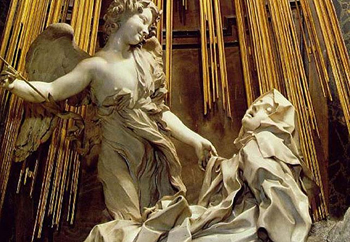
Рушатся оплоты монументального церковного искусства, протестантизм сводит до минимума или совсем ликвидирует монументальную живопись и архитектуру, скульптуру, светскую музыку и танцы. На смену церковным фрескам и плафонной дворцовой росписи приходит «бюргерская» живопись. Спрос, исходящий от горожан со средним достатком, был необычайно высок — картины пишутся не только на заказ, но и для рынка. Подобная торговля была широко распространена, для нее в основном изготовлялись небольшие по размеру станковые картины, предназначенные для скромных помещений.
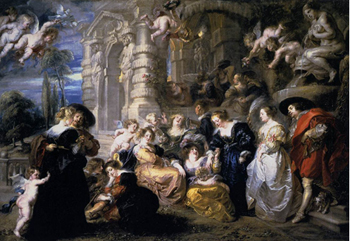
Предметом социальной гордости для поднимающейся буржуазии служит тот образ жизни, который она ведет, собственность, которой она владеет. И потому любимы жанровые картины, натюрморт. Сюжеты выбираются главным образом из повседневной жизни богатых слоев бюргерства – часто изображаются сцены веселящихся компаний, получение письма, приход гостя, домашний концерт. Они обыденны и постоянно повторяются, вообще играют незначительную роль, поскольку внимание обращено на внешнюю сторону. Сюжет служит предлогом для передачи костюмов, поз, предметов обстановки. Материал, объемы, формы изображаются с исключительным мастерством, в реалистической манере. Художник, отвечая на запросы публики, дает ей возможность любоваться тонким стеклом бокалов, серебряными блюдами и цветами, фруктами и устрицами, воспевая торжество материального мира, приходящего на смену миру горнему.
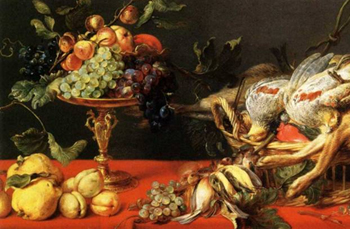
В духе данной эпистемы применительно к художественной практике трактуется античное наследие. Мера и порядок, правила и нормы, их подчинение строгому контролю разума объявляются главными критериями искусства. Не отражение реальной жизни, а создание идеальных образов, демонстрация облагороженных эйдетических схем определяется как цель творческого процесса. Рождая некую онтологическую абстракцию, художник должен был дистанцироваться от любого нарратива, от всего профанного, низкого, случайного, но концентрироваться на типологических обобщениях, высоких образцах, гармонично соединяющих разумное и прекрасное. Основой классицистической доктрины служил рационализм, особенно укорененный на французской почве.
Абсолютная власть осуществлялась по принципу жесткой централизации, унификации всех бюрократических процедур. Аналогичным образом выстраивался придворный церемониал, по этой же модели необходимо было организовать «функционирование» искусства, почетнейшей миссией которого являлось прославление монаршей особы. Искусство в абсолютистской рефлексии рассматривалось как дело государственной важности, требующее контроля и регламентации. Первостепенная роль отводилась специальной структуре – Академии живописи и скульптуры, получившей монополию на организацию художественного образования, проведение выставок. В стенах Академии была сформулирована доктрина жанровой легитимации «высокого» искусства, к которому причислялись исторические, религиозные, мифологические, аллегорические сюжеты.
Важнейшие течения могли развиваться не изолированно, а в непосредственной связи, нередко в пределах одной национальной школы – этот синтез достигает своего апогея во Франции во второй половине XVII века. Французский «большой стиль», соединявший элементы барокко и классицизма, призван был прославлять идеи роялизма. Строительство роскошного Версальского дворца, помимо прочих факторов, сделало Людовика ХIV законодателем мод в европейском придворном искусстве. Версаль символизировал торжество идей абсолютизма, что проявлялось в сопряжении большого дворцового здания и окружающего его ландшафта, в регламентации и подчинении регулярно спланированного парка строгой геометрической системе. Здесь каждый элемент работал на общую задачу, будь то парадная роскошь террас, садовый партер со стриженой зеленью, фонтаны, скульптурные композиции, отдельные павильоны.
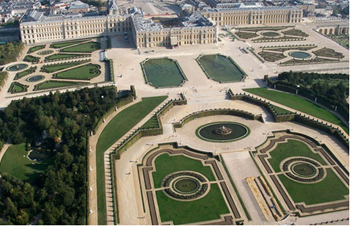
Преклонение перед большим королевским стилем охватило Европу, став одним из существенных факторов интернационализации придворной культуры. Дворцовая и парковая архитектура переживают свой рассвет: Версаль делается образцом, объектом для подражания других европейских монархов. Повторяются его Зеркальная галерея, принципы композиции, линейные формы дворцовых корпусов; входит в моду регулярная планировка парков, боскеты и парковая скульптура, тематические фонтаны. Влияние ансамбля Версаля, оказавшего большое воздействие на всю европейскую архитектуру, прослеживается также в центральной и восточной Европе. Соперничеством с ним были вдохновлены такие, несомненно, оригинальные монументальные дворцовые комплексы, как австрийские дворцы Шенбрунн, Бельведер, русский Петергоф и др.
Сменяются столетия и вместе с ними меняются и стили – величественность, мощь, экспрессия уходят в прошлое. Им на смену идет «культура салонов» – искусство интимного, камерного, манерно-утонченного рококо. Новая стилистика репрезентирует своими художественными формами эволюцию мировоззрения правящей элиты, но отражает одновременно архетип, который закодирован на более глубоком уровне: рококо символизировало закат абсолютизма, бессилие и слабость, угасание элитарной культуры старой Европы.
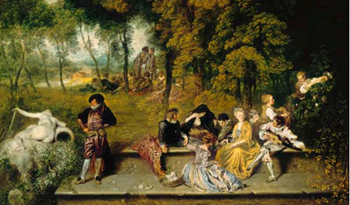
Непринужденная фривольность галантного века, еле уловимая ностальгия (по быстро утекающему времени, возможно) исключительно точно запечатлены в живописи рокайля. Светлый колорит картин Ватто и Буше, пастельные краски как нельзя более соответствуют атмосфере галантного времяпрепровождения. Галантные празднества оказались настолько важным элементом аристократического образа жизни, что им был специально посвящен отдельный жанр живописи, дотоле не существовавший и специально введенный в число признанных Академией жанров. Так, именно по этому жанру стал академиком признанный мастер изящной живописи Ватто.
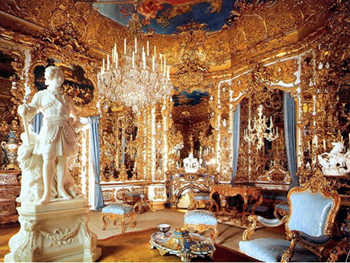
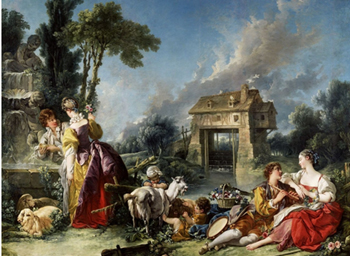
Происходили изменения и в области садово-паркового искусства. В Англии укореняется тип пейзажных парков: на смену регулярной композиции, пространству с геометрической планировкой приходят живописные, так называемые «английские» сады. Наряду с «французскими» они получили широкое распространение на континенте. Эта система вызывает к жизни и «естественные» водные компоненты, и небольшие архитектурные сооружения – беседки, гроты, руины; различные декоративные элементы — скамьи, колонны, вазы, скульптуру.
Меняются формы, краски, объемы. Но, как и раньше, художники связаны были с абсолютистской верхушкой, выполняли главным образом заказы властных структур. Как и раньше, группы лучших мастеров обслуживали королевский двор, ориентируясь на его специфические потребности и нужды, а директор Академии, исполнявший массу подобных работ (теперь им являлся Ф. Буше), носил титул «первого художника короля». Последняя глава в трилогии «королевских» стилей принадлежала классицизму — «стилю Людовика XVI». Пройдя фазу латентного существования, он выходит из тени и вновь громко заявляет о себе в последней трети XVIII века: как доминанта художественных практик он безраздельно господствовал в Европе на рубеже веков и в первые десятилетия XIX века. С началом революции, свергающей королевскую власть, абсолютизм приходит к концу. Монархия закончилась, но архетип еще не исчерпал себя, и продолжает жить обозначавшее ее искусство, поскольку изначально соотносилось с более широким социокультурным контекстом.
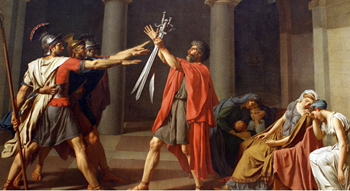
Пафос просветительского дискурса репрезентируется классицизмом. Резко обличая феодальные порядки, дидактика просветителей предъявляла особые требования к творческой сфере: широкое хождение получили идеи о моральных референциях искусства — оно должно было являться «школой нравов», наставляющей публику в добродетели (Дидро). Драматической поэзии, «моральной живописи» вменялось в обязанность поучать, исправлять и побуждать к добродетельным деяниям. В предреволюционное время на первый план выдвинулось искусство революционного классицизма: проникнутое духом гражданской доблести, оно обращается к античной истории в поиске вдохновляющих своим мужеством примеров. Героическая простота, суровость и лаконизм отвели ему роль художественного летописца революционных побед — «момента истины», ставшего поворотным пунктом европейской истории. Триумф классицизма продолжится и после Великой французской революции, во время правления Наполеона. Здесь он достигает кульминации, превратившись в официальный стиль вновь созданной империи – ампир.
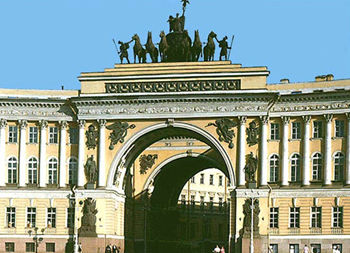
Общим в его развитии на различных этапах и в разных регионах являлось обращение к искусству античного мира, к первоистокам европейской культуры. «Вечное возвращение» художественных практик знаменует собой укорененность гетерогенных архетипических структур. Цикл повторяется вновь и вновь. Классицистический архетип, сигнифицирующий родовые черты западной цивилизации, дополнится в XIX веке мощным напором реалистических тенденций, отражающими новую, буржуазную картину мира. Именно реализму, укорененному в стихии рынка, обогащенному всеми предшествующими художественными открытиями, принадлежало следующее столетие.
ПРИМЕЧАНИЯ
[1] Зиммель Г. Конфликт современной культуры // Культурология. ХХ век: Антология. М.: Юрист, 1995. С. 379.
[2] Юнг К.Г. Настоящее и будущее // Аналитическая психология: Прошлое и настоящее. М.: Мартис, 1995. С. 165.
[3] Юнг К.Г. Структура психики и архетипы. М.: Академический проект, 2007. С. 91.
[4] Там же. С. 221.
[5] Хренов Н.А. Социальная психология искусства: переходная эпоха. М.: Альфа-М, 2005. С. 46.
[6] Лосев А.Ф. История античной эстетики. Софисты. Сократ. Платон. М.: Искусство, 1969. С. 265.
[7] Плутарх. О музыке. Пб.: Музгиз, 1922.
[8] Аристотель. Политика // Аристотель. Сочинения: В 4 т. Т. 4. М.: Мысль, 1983. С. 630.
[9] Этот культ подробно рассматривался у Г.С. Кнабе, М.Е. Сергеенко.
[10] Луций Анней Сенека. Нравственные письма к Луцилию. М.: Наука, 1977. С. 117. (86.7).
[11] Шпенглер О. Закат Европы, М.: Мысль, 1993. С. 257.
[12] Там же. С. 90.
[13] Власов В.Г. Стили в искусстве. Т. 1. СПб.: Кольна, 1995. С. 168.
[14] Эко У. Искусство и красота в средневековой эстетике. СПб.: Алетейя, 2003. С. 126.
[15] Мак-Коркодейл Ч. Убранство жилого интерьера от античности до наших дней. М.: Сварог и К, 1990. С. 97.
Статья поступила в редакцию 1 августа 2014 г.
Козьякова Мария Ивановна,
доктор философских наук, профессор
Высшего театрального училища (института)
имени М. С. Щепкина при Государственном
Академическом Малом театре России
e-mail: markoz@yandex.ru

ISSN 2311-3723
Учредитель:
ООО Издательство «Согласие»
Издатель:
Научная ассоциация
исследователей культуры
№ государственной
регистрации ЭЛ № ФС 77 – 56414 от 11.12.2013
Журнал индексируется:
Выходит 4 раза в год только в электронном виде
Номер готовили:
Главный редактор
А.Я. Флиер
Шеф-редактор
Т.В. Глазкова
Руководитель IT-центра
А.В. Лукьянов
Наш баннер:

Наш e-mail:
cultschool@gmail.com
НАШИ ПАРТНЁРЫ:
Мнение редакции может не совпадать с мнением авторов.
При полном или частичном использовании материалов ссылка на «Культуру культуры» обязательна.
© Научная ассоциация исследователей культуры, 2014-2024







